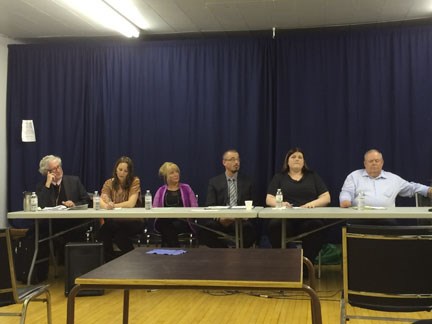There is no such thing as a cookie cutter styled resolution when it comes to domestic violence. That was one thing that came out clearly as a panel of experts broached the subject during a public meeting last Wednesday evening in the small Legion hall in Estevan.
The event, sponsored by the Estevan chapter of the Canadian Federation of University Women, was held to shed some light on how domestic abuse events affect the community, what can be done about it, and what is being done.
Cheryl Andrist president of the Estevan CFUW, said the evening's program illustrated the many facets of domestic violence, causes and effects and how the problem is being lessened through professional intervention.
The evening's program included a presentation by Dianne Delany from Regina who is co-ordinator of the Provincial Association of Transition Houses and Services.
The panel discussions included Rod Watson, counsellor for Alternatives to Violence; Lorelei Lachambre, Envision Counselling and Support Centre counsellor; Dee Dee Chomyk, author and domestic abuse survivor; Sgt. Kevin Reed, Estevan Police Service; Jody Tweed, social worker, Estevan Comprehensive School; and Gary Tedford, Addictions Services counsellor. The panel event was moderated by counsellor Gail Barrett.
The event included and welcomed the men into the fold and discussion with the expressed intent to also pay homage to International Women's Day.
"And let's not forget, there are violent incidents with men or boys as the victims," said Andrist.
The evening's program also received sponsorship support from the Status of Women office.
About 45 people were in attendance, said Andrist, and some of the evening's topics included physical as well as cyber bullying.
"I was impressed by the fact that the various agencies are working together to address the problems. They do connect and communicate to find the proper routes and programs," said Andrist. "They work with the individuals as well as with families."
She said the Estevan Ministerial Association was also represented with Rev. Stewart Miller in attendance, which was a welcomed addition to the evening's program.
"There was some discussion regarding how poverty, while not being a sole reason for domestic violence, certainly doesn't help solve the problem," said Andrist.
With Estevan having a unique situation of having many transient people within its midst, domestic disputes can certainly escalate more quickly, the group determined. Addictions add to the problems, and as panelist Tedford pointed out, he preferred to refer to victims of violence as survivors since that is exactly what they are since it is very difficult for many to really and truly get out of an abusive environment.
She also noted how panel members Tweed and Reed appeared to have a strong communication factor going when discussing school-related issues and relationships within that environment and their homes.
"Kids won't talk a lot about abuses in the home and families just don't seem to be as connected as before. There is more family time needed, more face-to-face time, rather than communication through texts and other digital devices," she said. "There might be more contact, but a lot less communication."
She said the Envision Counselling and Support Centre programs are impressive and technologies have certainly allowed them to reach out even further to help victims as well as improve their presence in the communities.
She said that Estevan survivors/victims make use of transition houses around the province, and she said it was impressive to learn how volunteers will go out in the middle of the night to collect families and put them in a safe place on short notice.
She said statistics show that Saskatchewan is one of the leading provinces when it comes to domestic violence situations, so there is a lot of work to do.
"There are referrals that can help victims receive parenting and life skills training. There are transition programs of various types and when you realize that many of these domestic incidents can lead to even more serious things, you know how important these problems and people are," Andrist said.
A couple of things were mentioned more than once during the course of the evening, she said, "and they were that people needed to take responsibility for their actions and there was a definite need to stress the importance of everyone being respectful of others, at all times."
Getting to those levels of responsibility and respect is where the challenge lies.




